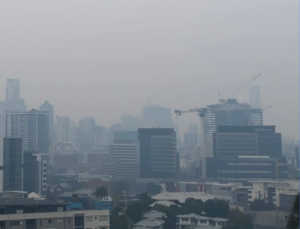 The QLD Government has declared a state of fire emergency across 42 areas in Queensland following a period of severe fire weather conditions with bushfire smoke haze affecting many areas of Queensland. A warning has been issued for Karara, south of Leyburn on the Southern Downs, with a bushfire travelling towards the vicinity of the Cunningham Highway and Toowoomba Karara Road.
The QLD Government has declared a state of fire emergency across 42 areas in Queensland following a period of severe fire weather conditions with bushfire smoke haze affecting many areas of Queensland. A warning has been issued for Karara, south of Leyburn on the Southern Downs, with a bushfire travelling towards the vicinity of the Cunningham Highway and Toowoomba Karara Road.
Smoke particles comprise a combination of organic and inorganic particles and carries a high-bacterial load. Organic particles are essentially food for bacteria (including Legionella). Cooling towers act as air-scrubbers – they suck-in air and any airborne dust is captured in the water and trapped on wet surfaces.
As a consequence of the bacterial load and ‘air-scrubbing’ effect, cooling tower operators can expect a high dirt and bacterial load in their cooling towers.
Immediate Recommendations
For the bushfire affected areas:
- Shut down your cooling tower
- If shut down is not possible, turn off the fan or reduce its operation
After the bushfire:
- Schedule an inspection and disinfection visit with your water treatment provider
- Monitor the cooling tower system water quality and consider a tower clean over the coming weeks
Improvement Options
ORP Control
HydroChem recommends ORP controlled dosing of oxidising biocides for cooling tower systems. The benefit of ORP is that it continuously monitors the level of oxidising biocide and doses on demand – rather than via timer.
In the current situation, higher levels of oxidising biocides are likely to be consumed due to the contaminant load in your cooling tower system. An ORP system will increase dosage to counteract the high contaminant load.
Cooling Tower Filtration
HydroChem recommends screen filtration combined with cooling tower basin agitation system.
A basin agitation system stirs-up particles in the cooling tower to get them into the body of the flowing water. A screen filtration system will filter out all solids (above the micron rating) and flush them out of the system. Screen filters are preferred to sand/media filters for two reasons:
- Sand/media breaks down and gets contaminated – potentially becoming a source of bacteria
- Screen filters operate at a higher flow rate enabling basin agitation whereas sand/media only filters the body of flowing water
In the current situation, a screen filtration system will remove all solids (above the micron rating of the screen) caught by the ‘air-scrubbing’ effect of the cooling tower.
If you have any queries, please contact Gavin Richardson, QLD State Manager
gavin.richardson@hydrochem.com.au QLD Office: (07) 3344 3266
